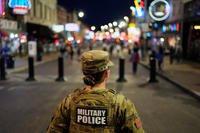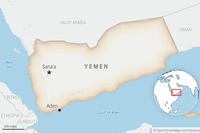Six months after United Nations Secretary-General António Guterres proposed that the global organization take on some of the funding for the multinational force that's been struggling to tackle violent gangs in Haiti, the Trump administration says it is ready to support the plan.
"The United States intends to share a draft U.N. Security Council Resolution with the U.N. Security Council that establishes a U.N. Support Office for a multinational security force in Haiti," a State Department spokesperson confirmed to the Miami Herald.
The spokesperson did not say when the resolution will be presented for a vote, but sources said it may come up at a Security Council meeting about children, armed conflict and human rights in Haiti. The discussion is being planned by Panama, which is presiding over the Security Council this month.
"U.S. backing for the logistics package will breathe new life into discussions" about the Kenya-led mission in Haiti, said Daniel Forti, a senior U.N. analyst with the International Crisis Group. "But Washington can't presume the other Security Council members will easily go along with them after months of delay. Gangs have increased their control of Port-au-Prince while the U.S. slow-walked its deliberations. American diplomats should prepare for the heavy lift needed to get this effort over the finish line."
Washington's long-awaited support for Guterres' proposal comes at a complicated time in the Trump administration's relationship with the U.N.
Congress last month approved an administration proposal to take back more than $7 billion in foreign aid spending, which included millions of dollars to U.N. agencies and $361.2 million that was previously approved for international peacekeeping operations.
While aid groups and others are trying to determine what actually got cut, U.N. officials had already warned that the effects of cuts by the U.S., which was already in arrears on its assessed U.N. contributions, were already showing up in existing missions as they scrambled to save cash. Meanwhile, the U.S. can expect pushback from China and Russia, which have never passed up a chance in discussions about Haiti on the Security Council to criticize Washington.
So far, the pledges in a U.N. Trust Fund for Haiti amount to $112.5 million. It is just enough to pay for salaries, but not enough for equipment or to support the expansion of the multinational security force, which was envisioned to have 2,500 personnel.
"There must be concrete commitments from other regional partners and stakeholders -- including robust financial and contributing force commitments," the State Department spokesperson said, commending "the dedication of the courageous members" of the Kenya-led mission MSS and Haitian police.
The scourge of gang violence throughout Haiti has a destabilizing effect not just in the country but in the hemisphere, said the spokesperson, adding "The United States continues to support the Haitian government's efforts to defeat the gangs and restore stability in the country and our region."
In February, Guterres proposed that instead of deploying traditional peacekeepers to Haiti, the Security Council maintain the current Kenya-led Multinational Security Support mission in the country, but establish a support office to provide structural and logistical support. The office, he proposed, would be funded from the U.N.'s peacekeeping budget, which member nations contribute to.
For months, however, the proposal has been in limbo as gang violence surges, more neighborhoods fall and the country sets a new record, 1.3 million, for the number of people displaced by the violence. Until now Washington had remained mum as to whether the U.S. intended to push for a deployment of traditional peacekeepers or support Guterres' plan.
In the meantime, the Haitian government has turned to a private military firm run by Erik Prince, the founder of Blackwater, for help. But the group's presence and use of weaponized drones by an anti-gang task force operating out of the prime minister's office has raised concerns about collateral damage, and the overall strategy for tackling the causes of the gang crisis.
Guterres, who isn't a fan of peacekeeping operations and said there is no peace yet to keep in Haiti, has suggested "a dual-track strategy" to enable the Kenya-led force, the Haiti National Police and Haitian authorities "to substantially reduce gang territorial control through peace enforcement."
Pushing for a more robust mandate that would allow for the use of force and the capacity to conduct targeted operations against gangs, he has also proposed the creation of the U.N. Support Office to provide logistical and operational support through the U.N.'s peacekeeping budget.
Last month, as members of the Security Council met to decide on an extension of the mandate of the U.N. political mission in office, some members expressed frustrations over the lack of clarity on a way forward.
They were not alone. Kenyan President William Ruto, in a June letter to the council, spoke about the need for more and better equipment, and more funding and personnel. The first two Kenyan police contingents of 199 and 184 police officers that arrived on June 25, 2024 and a few weeks later in early July, respectively, are due to be rotated out, the Kenyans have said.
"While Kenya had trained 1,000 officers for deployment, 261 mission-ready officers remain on standby because the current contract for life support in theatre cannot cater for them," Ruto said.
The operations contract for the base in Haiti for the Kenyan force expires on Sept. 30, the day the mission's one-year mandate is up for renewal before the Security Council. Asked about funding for the base, a U.S. Defense Department spokesperson said the Pentagon "provided an extension to the MSS," but declined to discuss details.
© 2025 Miami Herald.
Visit miamiherald.com.
Distributed by Tribune Content Agency, LLC.












